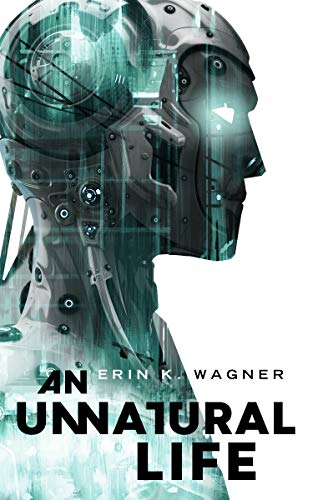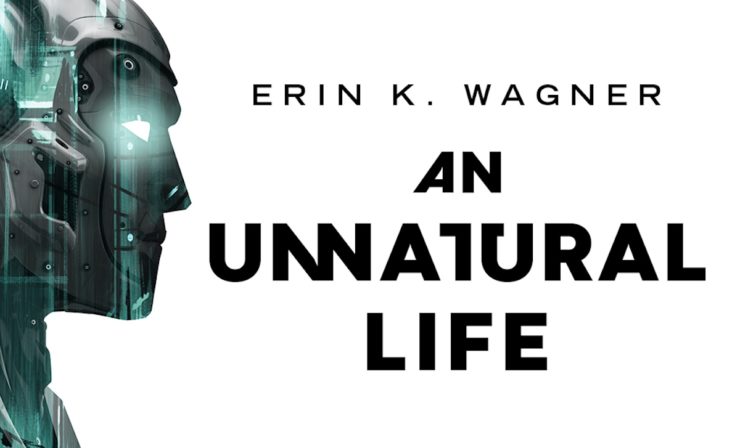How do we ensure that the rights of all beings are respected and they are given justice and a fair hearing under the law? Who will stand up when a majority treats someone as a thing, rather than a person? Who can stand against the tyranny of a settlement, a society, a species?
These are the questions at the heart of Erin K. Wagner’s novella, An Unnatural Life.
Our story is set on Europa, where humans have established a colony in the mid 22nd century. It’s at the edge of human society, and space and resources are at a premium (no one lives alone for example, which becomes character relevant as the novella goes along). Both humans and robotnici (sentient robots) live and work in the community. The bias against the robotnici is strong, however. And so when a robotinik, 812-3, is convicted of murder, there are few who think of the rights of the robot, and if not for previous law, they would have long since been rebooted or recycled, rather than imprisoned.
Enter our main character, Aiya Ritsherer. She’s a lawyer, working with the Prisoner Rehabilitation Program on Europa. Perhaps it is a futile effort to visit 812-3, given the recidivism of robotnici prisoners, perhaps futile given the biases of society to even to try. But Aiya is determined to do her job, and as she forges a connection with 812-3, the robotnik has a dangerous request, one that defines the shape of the novella: 812-3 wants Aiya to file an appeal of its conviction.
Buy the Book


An Unnatural Life
An Unnatural Life’s focus on justice, police brutality, the rule of law, and who will speak for those who are not heard has only become even more pointed and relevant by events that have occurred since it was written, and now upon its publication. For me, the strength of this work is not so much on character, or worldbuilding, but the themes and questions that it raises. Our knowledge of Aiya in the end is relatively thin, even given a novella length. There are some interesting worldbuilding bits, but those are relatively thin on the ground except where they wrap around 812-3 and how we got here.
The narrative, then, focuses on “An Unnatural Life”, describing the robotnik’s lifetime (longer than a human one) sentence. It is definitely that, an unnatural life in its length and also in its nature. We get enough detail through the novella that robotnici are not technically slaves even given their precarious status—they have some basic rights not to be killed or shut down outright, but their status in society is definitely of a lower class of beings, whose rights are on, to use a turn of phrase, thin ice. And Aiya as well, once she takes on the effort of the appeal. Themes of an unnatural life of isolation, of being apart from one’s fellow humans is one that the author applies to Aiya as well, to heartbreaking effect. As Aiya digs deeper, and learns the full story of the murder, the reaction of the human community to Aiya’s advocacy is heartbreakingly and violently predictable. Giving power and rights to the oppressed, a nonhuman (or “unnatural”) being is something that the colonists on Europa are very loath to do.
There is a key passage early on, where Aiya and Peri (her roommate, an architect) talk about Aiya moving toward an appeal. It lays bare the contradiction and the central unsustainable problem of having created sentient life that have human rights, but are still mostly treated like slaves. It is, as Peri says, having it both ways, and it’s an unsustainable contradiction: “Either they’re machines, or we’re monsters.” Later on the Captain of the prison hones on this, insisting that “we have the right to make decisions that protect humanity. Humanity.” And the plot and events ratchet only further from there.
The novella complicates and reinforces the issues of an unnatural life with short running messages from a drilling site on the moon that explore the possibility that there is alien life on Europa, that something is living on the moon. This puts another spotlight on the thematic questions of the novella: how do we ensure justice and rights for all, not just those who are like ourselves? How can we extend the promise and the hope of the truths that we believe to be self-evident to people who are manifestly different than us? As readers we can see how the society of Europa is grappling with the questions that 812-3 and Aiya raise, and see that bigger questions are headed their way. It’s a rather well done bit of foreshadowing for the society on Europa, inviting the reader to connect the dots.
The personal story of Aiya and her personal and costs are not quite as well rendered as the larger, global questions. They are indeed painful, but I didn’t think that they were foregrounded or laid down enough to really see and feel and connect with Aiya’s personal story as much as I would have liked.
The novella provides no easy answers, and no solutions to the questions it raises in terms of its themes. The ending is not an uplifting one, it is in the end rather cynical and not confident that we will do better. It takes a lot of squinting and perhaps a dollop of personal hope on the part of the reader, that the long arc of history is indeed being bent here, albeit in a long game, shallow extend, toward anything resembling justice. What An Unnatural Life makes clear, even at professional and personal cost to Aiya, is that without the bravery and willingness to put oneself on the line, that arc never will bend at all. That’s a sobering and thoughtful message, for any age, especially our own.
An Unnatural Life is available from Tordotcom Publishing.
An ex-pat New Yorker living in Minnesota, Paul Weimer has been reading sci-fi and fantasy for over 30 years. An avid and enthusiastic amateur photographer, blogger and podcaster, Paul primarily contributes to the Skiffy and Fanty Show as blogger and podcaster, and the SFF Audio podcast. If you’ve spent any time reading about SFF online, you’ve probably read one of his blog comments or tweets (he’s @PrinceJvstin).










